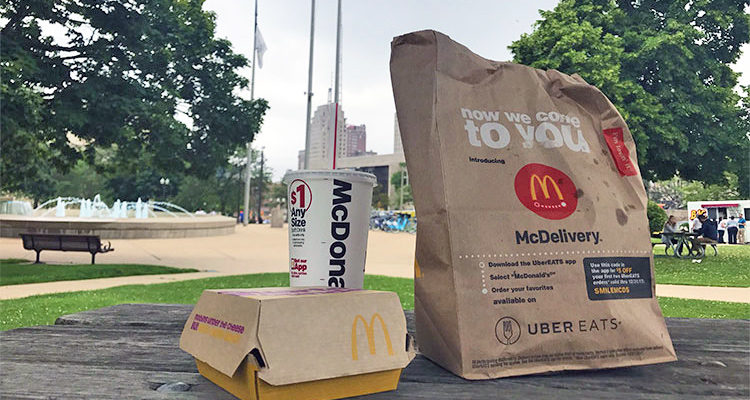A proposed ordinance to add a fee to food delivery orders placed through third-party services like Uber Eats, Grubhub, and Postmates was held for further discussion Wednesday morning at a Milwaukee Public Works Committee meeting. The ordinance, sponsored by Alderwoman Nikiya Dodd, seeks to impose customers with a $0.60 fee in order to raise revenue for “street maintenance and to supplement non-rail-based public transportation within the city.”
“The purpose of this [ordinance] is to provide the department of public works sufficient resources to maintain public streets and to reduce added wear and tear on public streets arising from the proliferation of on-demand food delivery services,” reads the proposal. “This will be accomplished by applying funds generated from a food delivery network service fee to street maintenance and increasing access to public transportation.”
Dodd made a case for the fee at Wednesday’s meeting, along with Supervisor Sylvia Ortiz-Velez and Senator Lena Taylor. All three officials discussed Milwaukee’s ever-dwindling cut of shared revenue from the State of Wisconsin, the city’s limited tools for creating new revenue, and how the food delivery fee could be used to bring in “millions of dollars” for things like pothole repair.
“This is a tool you have in your toolbox right now,” Ortiz-Velez told the committee. “You don’t need a change in state legislation to pass this ordinance.”
“It’s in your power. You get to make the choice. It’s not state law,” said Taylor.
The City disagreed. When asked by Committee Chair Alderman Bob Bauman if the proposal was legally enforceable as written, Deputy City Attorney Adam Stephens replied with one word: “No.”
“We are not taking a policy decision on whether a tax should be made or not,” Stephens said. But, he added, he was open to further exploring the legality of the proposed fee, and whether or not the fee could single out third-party services like Uber Eats and exclude in-house delivery services like Dominos.
Bauman questioned the proponents about the specific $0.60 price tag. Taylor said the amount was not arbitrary, and that it was based on “the average that’s out there now.” When asked what other states or cities had enacted similar fees, the ordinance proponents promised to add that information to the file.
“This file is awfully thin for what is a major piece of policy,” Bauman said. He added that “the last major fee increase we did, the wheel tax, took three years.”
What is included in the file, however, is opposition. A letter from the Wisconsin Restaurant Association questions “why only restaurant food delivery is targeted in this proposed ordinance,” asks “why should consumers pay additional fees for what is already paid for through other taxes and fees,” and urges the committee to “consider the cost of enforcement in this ordinance.”
“We urge [to] not move this proposed ordinance forward,” the letter reads. “It unfairly targets small, independent restaurants, their customers and the drivers who make deliveries.”
An opposition letter from Uber Eats claims the fee “hurts small businesses while rewarding many big chains” like Domino’s or Jimmy John’s; that it “fails to include other bigger users of public streets” like FedEx, Amazon, and UPS; that it “fails to account for gas and wheel taxes already paid by delivery people”; and that it “impacts consumers that stand most to benefit from food delivery.”
Opposition letters from the Washington DC-based Internet Association and the Midwest branch of TechNet echo similar concerns.

